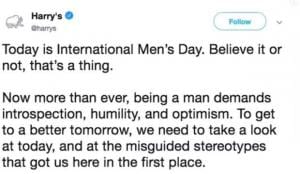I have been hesitant to write on the viral Gillette ad for a few reasons. The first, and primary, being the sensitive nature of the content. The #metoo movement and “toxic masculinity” discussions are so thin-skinned it seems almost impossible to have a well-reasoned, thoughtful discussion. To some extent, I understand this. Defining and appropriating sexuality in terms of gender, acceptable boundaries, and relationships is deeply personal to all involved. Notwithstanding, there are serious problems on both sides of the proverbial wall, when a position is not rooted in Scripture’s ideals.
Given the established sensitivity of the topic, I feel compelled to state clearly, concisely, and unequivocally: sexual abuse and sexual harassment is wrong and sinful. There are no excuses. If I am honest, I still do not know what “toxic masculinity” exactly means. It seems very culturally subjective. So, I will refrain from any specific commentary on this issue. Moving on.
The second reason I have been slow to comment on the commercial is that I didn’t want to throw more fuel into the social media fire. If I were more entrepreneurial, instead of writing a blog piece, I would just sell some t-shirts that say proudly “I survived the Gillette ad firestorm of 2019.” But as it is, I’ve sat on my thoughts for about a week, hoping it would die down and go away. But it hasn’t. Instead, other razor companies are now riding Gillette’s social commentary coattails, and I cannot remain silent anymore.
Earlier this week, Harry’s Razors tweeted this:
“Today is International Men’s Day. Believe it or not, that’s a thing. Now more than ever, being a man demands introspection humility, and optimism. To get to a better tomorrow, we need to take a look at today, and at the misguided stereotypes that got us here in the first place”
I’m pretty sure just typing that tweet out caused my IQ to fall a few points. When I first read it I almost wondered if Harry’s Razors hired comedian Jack Handey to run their social media platform. A fitting new twitter handle might be: “Cheap Thoughts by Cheap Razors”. Why cheap? Well, because the whole debacle is little more than a marketing circus. Both Gillette and Harry’s are just after your business.
I’m flabbergasted so many people are bent out of shape because some cut-rate razor companies decided to offer some hot-take social commentary. It’s ludicrous! For the life of me, why anyone would even follow a razor company on Twitter? Are you looking for coupons or something? That adds an entire new layer of absurdity to the mix. You follow Harry’s or Gillette to try and save a quarter on your next blade refill and instead you get social justice philosophy.
I want to grab everyone by the ears, look them in the eye, and remind them that they are played. This entire fiasco is a marketing ploy to make money. The people who made the Gillette commercial are paid to do a job. They aren’t a non-profit company. They sell razors. Yes, I am aware that Gillette is donating some money to causes to prevent sexual abuse, harassment, etc. But even that is done with under the banner of profit.
 Proctor & Gamble, the parent company of the Gillette brand, says in their mission statement that everything they do is directed towards profit. To keep the scope of all this in perspective, Proctor and Gamble had revenues of $65 Billion last fiscal year. That number is more than the GDP of several US states! P&G is a mega company with 1 thing in mind: mega-money. If P&G is truly concerned about helping you and your loved ones become “the best man you can be,” then they are colossal hypocrites.
Proctor & Gamble, the parent company of the Gillette brand, says in their mission statement that everything they do is directed towards profit. To keep the scope of all this in perspective, Proctor and Gamble had revenues of $65 Billion last fiscal year. That number is more than the GDP of several US states! P&G is a mega company with 1 thing in mind: mega-money. If P&G is truly concerned about helping you and your loved ones become “the best man you can be,” then they are colossal hypocrites.
Let’s consider another brand P&G owns – Old Spice. Old Spice has notoriously made commercials exploiting/promoting manhood. As an example, in 2014, Old Spice launched an ad campaign called “Momsong” This commercial portrays moms lamenting over their sons growing up and becoming men – as indicated by their use of Old Spice body spray.
The lyrics to the song/commercial are:
“Now my sweet sons sprayed into a man…. we know just who to blame. When sons have fun with women and misbehave. Old Spice sprayed a man of my son. Now he’s kissing all the women and chores aren’t done. He was just my little sweeties’ tiny fingers, hands, and feeties’. Now he’s touching, kissing, feeling all the women because Old Spice…”
Kissing women instead of chores? Touching, kissing, feeling all the women? Disgusting. That is not manhood, Proctor and Gamble. As a reminder, this is the exact same company that owns Gillette and the infamous “toxic masculinity” ad. It’s absolute hypocrisy. The American public is getting duped by simple branding. The lesson? Don’t get your social ideals from companies.
However, for the point to truly stick, I think we need to dig deeper into the financials. Around 2010, P&G began losing market share to low-priced competitors such as Dollar Shave Club, Schick, and our social commentator friends at Harry’s Razors. They have been in decline for six straight years. From 2010 to 2016 they lost about 20% market share. That’s a lot. If you estimate their revenues to be about $6.5B, that means they lost an estimated $1.3 Billion in market share. This 2016 article from The Motley Fool outlines more on the decline and loss in market share.
So, what do companies do when they lose money? They use marketing techniques and campaigns to attract new buyers.
Gillette/P&G may have some employees who share the vision communicated in their new commercial. But the fact remains, everyone involved in that ad was paid to help P&G recover their lost market share, and the early indicators are that it’s working.
I believe I heard Ben Shapiro say that this past week, Gillette had something like 1.5 million mentions on twitter, up from only 10k the week before. That’s huge! With this new “be the best man you can” ad campaign, P&G is attracting new demographics. Historically, Gillette’s consumers have been men over the age of the 35. Though, 62% of the recent burst in online conversation is being facilitated by women, and 75% of them are under the age of 35. If an objective of this campaign was to reach more female consumers, Gillette succeeded. Ethical and social commentary aside, the marketing move here was genius.
But there it is again. The underlying problem with the whole thing – the social commentary. I am worn out of companies taking stances on social commentary. Certainly, they are free to do so. But, if I watch a commercial about razors, I would like for it to tell me about, oh, I don’t know, maybe…. razors? This is my opinion, and may not be shared by other writers on this site. I know some people like it when companies take stances. Though for me, I don’t want to be told by a marketing department what to think about manhood or womanhood. In the case of Gillette, it’s truly impossible to know where the line of intention and manipulation really lies. This is why we must look to holy Scripture for such definitions and worldview assessment. Any other source is sinking sand.
In Scripture alone will we find the objective truth needed to rightly discern what is proper manhood and womanhood. Just a few years have passed since P&G told us manhood is womanizing and neglecting responsibilities. Commercials and social commentary are subjective and will be forgotten, but the Word of God remains forever.

















